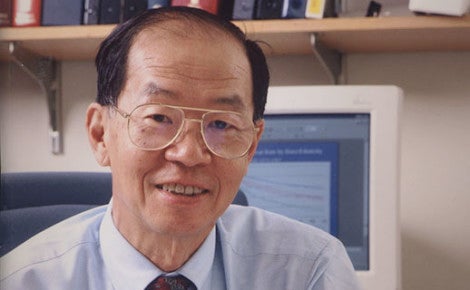June 18, 2015 — Frederick Pei Li, who helped inaugurate the era of cancer genetics by demonstrating that people can inherit a genetic susceptibility to develop certain malignancies, died on June 12 at the age of 75. A professor at Dana-Farber Cancer Institute (DFCI), Harvard Medical School, and Harvard T.H. Chan School of Public Health, Li laid the groundwork for today’s genetic counseling services for people with an inherited risk of cancer—and for efforts to develop cancer-prevention strategies for such individuals.
In the late 1960s, Li and his colleague at the National Cancer Institute (NCI), Joseph Fraumeni, began tracking patterns of cancer in children. Together, they identified a small number of families in which the same rare cancers had arisen across multiple generations. Their research led them to describe what is now known as Li-Fraumeni syndrome, a rare but devastating condition in which people are highly prone to develop a variety of serious cancers at an early age.
For the next two decades, Li and his colleagues worked to identify the mutated gene or genes responsible for the syndrome. In 1990, they published a paper identifying a mutation in p53, a tumor-suppressor gene, as the culprit. It was one of the first times an inherited abnormal gene was linked to cancer in humans. The finding paved the way for the discovery of other cancer-susceptibility genes such as BRCA1 and BRCA2, which increase the risk of breast or ovarian cancer when inherited in a mutated form.
For their breakthrough research, Li and Fraumeni received the prestigious Charles S. Mott Prize of the General Motors Cancer Research Foundation. Their work led to the development of a genetic test for Li-Fraumeni syndrome, which became a paradigm for the evolving field of genetic epidemiology.
“I was attracted to studies of cancer families because epidemiological studies show that virtually all cancers manifest a tendency to aggregate in families,” Li wrote about his research. Following his discovery of a connection between mutated p53 and Li-Fraumeni syndrome, Li helped create a center at Dana-Farber to test people for inherited risks for cancer. That center, the Friends of Dana-Farber Cancer Institute Cancer Risk and Prevention Clinic, became a model for genetic testing and counseling centers across the country.
“Fred Li is best known for his pioneering work in heritable aspects of cancer (the Li-Fraumeni Syndrome), but as his career progressed, he turned his attention to cancer prevention,” said David Christiani, Elkan Blout Professor of Environmental Genetics at Harvard Chan School. “He was very devoted to community-based research, health communication, epidemiology, and prevention strategies. In 1991, his efforts in prevention were recognized when he became head of Dana-Farber’s Division of Cancer Epidemiology and Control. Fred will be sorely missed in the cancer epidemiology community.”
Glorian Sorensen, Professor of Social and Behavioral Sciences at Harvard Chan School, and Faculty Vice President for Faculty Development and director of Center for Community-Based Research at DFCI, said she is “deeply indebted to Fred for his mentorship, his support, and his belief in me.” By establishing DFCI’s directions around cancer prevention in the early 1990s, “he initiated a critical collaboration with our School, which led to my recruitment, as well as that of others, including Karen Emmons and Vish Viswanath,” she said. “His vision for the benefits that could come from the collaboration around cancer prevention between these institutions has expanded the model for population sciences research well beyond the Harvard community.”
She added, “I will always cherish the experience of working with him and knowing him as a wise, gentle man.”
Fraumeni, of the Division of Cancer Epidemiology and Genetics at NCI, said, “Fred had a knack for making important clinical and epidemiological observations and taking them to the next level. This often meant crossing disciplines, which in my experience is not always easy, but collaborators were drawn not only to the scientific ideas and generated by Fred, but also by his friendly, calm, and thoughtful demeanor, and his generosity of spirit.”
“Fred Li made gigantic contributions to cancer research and care. In many ways, he was one of the principal architects of the modern era of cancer genetics and genomics,” said Dana-Farber President Edward J. Benz Jr.
Born in Canton, China, in 1940, Li was raised in New York City, where his parents operated a Chinese restaurant. He received a BA in Physics from New York University, an MD from the University of Rochester, and an MA in demography from Georgetown University. In 1967, he joined the Epidemiology Branch of the NCI.
Following fellowships at Peter Bent Brigham Hospital and New England Medical Center, Li was an associate staff physician at New England Medical Center from 1971–78, an associate in hematology at Boston Children’s Hospital beginning in 1975, and an assistant in medicine at Peter Bent Brigham Hospital from 1974–79. He first came to Dana-Farber in the early 1970s as a medical officer in the NCI’s Epidemiology Branch and became an attending physician in 1976. He joined the Dana-Farber faculty in 1981 as an associate physician, headed the Division of Cancer Epidemiology and Control from 1991–98, and served as vice chair for Population Sciences in the Department of Adult (now Medical) Oncology from 1998–2002. He was professor of clinical cancer epidemiology at Harvard T.H. Chan School of Public Health and professor of medicine at Harvard Medical School, where he held the position of Harry and Elsa Jiler American Cancer Society clinical research professor. In 1996, Li was appointed by President Bill Clinton to the NCI’s National Cancer Advisory Board.
Li served as editor-in-chief of the journal Cancer Epidemiology Biomarkers & Prevention and was on the editorial boards of numerous professional publications including Cancer Research, the Journal of Clinical Oncology, and the American Journal of Medical Genetics. In 1999, he was awarded the American Cancer Society Medal of Honor in Clinical Research.
Photo: Courtesy Dana-Farber Cancer Institute
